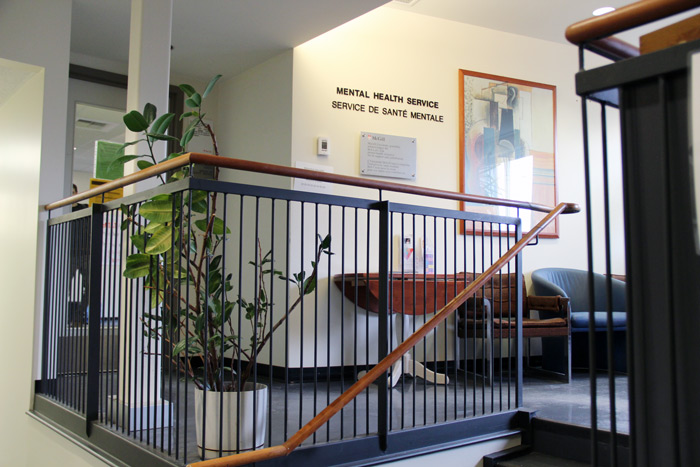It’s that time of year again: Midterm season. McLennan library now has permanent tenants, and the weekly Tokyo outing is declined with, “Sorry, I have to study.” Due to the added academic pressures, midterm season sees a great increase in demand for mental health services—a need that isn’t easily satisfied at McGill. In addition to the classical Counselling Services, students have access to a variety of alternative mental health resources to assist them during particularly stressful weeks. The McGill Tribune spoke with SSMU Vice President (VP) Student Life Cody Esterle about these services and resources.
Peer Support Center
Esterle’s first suggestion was the Peer Support Centre, which offers a space for McGill students to speak to a trained peer mentor about any issues they are experiencing. Open Monday to Friday from 9 a.m. to 5 p.m., the Peer Support Centre is accessible for those wanting a discreet, anonymous conversation; they accept walk-ins for any sort of problem that a student may have.
Peer mentors are also accessible by appointment and will listen and share resources during their 45-minute sessions. The Peer Support Center is currently located on the second floor of 3471 Peel Street.
Nightline
Nightline is a confidential phone line that operates from 6 p.m. to 3 a.m. every night. They are an anonymous, non-judgemental service run by McGill students extensively trained in crisis management and active listening.
“Nightline is […] a great resource for someone to talk to when [they] have to pull an all-nighter and start feeling [poorly], and no one is around,” Esterle said. “[Nightline is] just a phone call away.”
Nightline accepts calls from anyone, McGill student or otherwise. The organization lists many other resources on its website, including French phone lines, calming exercises, and LGBT-specific support.
Poetry and Comedy shows
Esterle also shared some of their favourite off-campus stress outlets. Small, student-run shows for poetry, comedy, and improv provide a space to unwind and meet new people in the McGill community. Creative activities have been found to relieve stress, aid communication, and slow cognitive decline.
“What I personally like to do is, […] after a long day studying, going to a poetry night at Kafein or McSway or to […] improv shows,” Esterle said. “It’s really nice to take a break and remind myself of the things and places I love and that my grades aren’t all that matters.”
Kafein, a café in the downtown area on Bishop Street, hosts an open-mic poetry night every other Tuesday. They offer a safe, anti-racist, and anti-sexist space in which to share poetry. Similarly, McSway Poetry hosts poetry recitals at 3559 University Street. Montreal Student Comedy hosts stand-up comedy shows by students, for students. Otman’s Basement: Comedy on Campus is the group’s series of free comedy shows held on the last Thursday of every month in the McConnell Engineering building.
Counselling Services
Most importantly, for students requiring professional attention, Esterle suggests McGill Counselling Services’ workshops and groups. These sessions provide community-based support for students seeking counselling on a range of problems.
Counselling Services offers life skills workshops that cover happiness, mindfulness, and overcoming perfectionism. They also have issue-specific workshops that focus on trauma, body image, grief, and sexual assault. Workshops are mostly free, exclusive to currently-enrolled students, and require registration. Most workshops begin mid-October or early November.
Students should reach out for help if they feel they are in a crisis situation. Campus services are available to offer students professional and medical treatment, including Counselling and Mental Health Services. If you feel that you, or someone you know, is in immediate danger, call 9-1-1, or if you are on campus, Campus Security at 514-398-3000.







